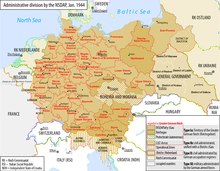Areas annexed by Nazi Germany



There were many areas annexed by Nazi Germany both immediately before and throughout the course of World War II. Territories that were part of Germany before the annexations were known as the "Altreich" (Old Reich).[1]
Fully annexed territories


According to the Treaty of Versailles, the Territory of the Saar Basin was split from Germany for at least 15 years. In 1935, the Saarland rejoined Germany in a lawful way after a plebiscite.
The territories listed below are those that were fully annexed into Germany proper.
Partially incorporated territories
The territories listed below are those that were partially incorporated into the Greater German Reich.
| Date of establishment | Preceded by | Succeeded by |
|---|---|---|
| 25 Oct 1939 | ||
| 1 Aug 1941 | ||
| Date of establishment | Preceded by | Succeeded by |
|---|---|---|
| 10 Sep 1943 | ||
Planned annexations
| Date of announcement of annexation | Area planned to be annexed | Planned succession |
|---|---|---|
| Never. The areas were to be established from the Reichskommissariat of Belgium and Northern France (established 12 July 1944), but this never happened. |
||
In the coming Nazi New Order, other lands were considered for annexation sooner or later, for instance North Schleswig, German-speaking Switzerland, and the zone of intended German settlement in north-eastern France, where a Gau or a Reichskommissariat centred on Burgundy was intended for creation, and which Heinrich Himmler wanted to turn into the SS's very own fiefdom. The goal was to unite all or as many as possible ethnic Germans and Germanic peoples, including non-Germanic speaking ones considered "Aryans", in a Greater Germanic Reich.[citation needed]
The eastern Reichskommissariats in the vast stretches of Ukraine and Russia were also intended for future integration into that Reich, with plans for them stretching to the Volga or even beyond the Urals, where the potential westernmost reaches of Imperial Japanese influence would have existed, following an Axis victory in World War II. They were deemed of vital interest for the survival of the German nation, as it was a core tenet of Nazism that Germany needed "living space" (Lebensraum), creating a "pull towards the East" (Drang nach Osten) where that could be found and colonized.
North-East Italy was also eventually to be annexed, including both the Operational Zone of the Adriatic Littoral and the Operational Zone of the Alpine Foothills, but also the Venice region.[3][4] Goebbels went as far as to suggest taking control of Lombardy as well:
Whatever was once an Austrian possession we must get back into our own hands. The Italians by their infidelity and treachery have lost any claim to a national state of the modern type. — Joseph Goebbels, September 1943 [5]
The annexation of the entire North Italy was also suggested in the long run.[6]
See also
Notes
- ^ Kaplan, Marion A. (1999). Between Dignity and Despair: Jewish Life in Nazi Germany. Oxford University Press. ISBN 978-0-19-983905-6.
- ^ Bloodlands: Europe Between Hitler and Stalin
- ^ Petacco 2005, p. 50.
- ^ Santi Corvaja, Hitler & Mussolini: The Secret Meetings, p. 269
- ^ Rich, Norman (1973). Hitler's war aims. Norton. pp. 320, 325. ISBN 0393054543. [verification needed]
- ^ Kersten 1947, p. 186.
